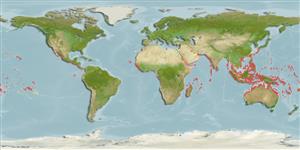Teleostei (teleosts) >
Tetraodontiformes (Puffers and filefishes) >
Monacanthidae (Filefishes)
Etymology: Cantherhines: Greek, kanthos = the outer or inner corner of the eye, where the lids meet, 1646 + Greek, rhinos = nose (Ref. 45335).
More on author: Rüppell.
Environment: milieu / climate zone / depth range / distribution range
Ecology
Marine; reef-associated; depth range 0 - 20 m (Ref. 9710). Tropical; 32°N - 32°S
Indo-Pacific: Red Sea south to South Africa (Ref. 4421) and east to southern Japan and southeastern Oceania. Eastern Atlantic: Gulf of Guinea, Annobon Islands, south coast of Africa (Ref. 3592). Replaced by Cantherhines sandwichiensis in the Hawaiian Islands (Ref. 37816).
Size / Weight / Age
Maturity: Lm ? range ? - ? cm
Max length : 25.0 cm TL male/unsexed; (Ref. 3592); common length : 15.0 cm TL male/unsexed; (Ref. 3467)
Dorsal spines (total): 2; Dorsal soft rays (total): 32 - 36; Anal spines: 0; Anal soft rays: 29 - 32. Can adopt three basic color patterns: mottled grey and brown, dark brown, or grey with a network of close-set polygonal spots. All have a small white spot at the rear base of the second dorsal fin and sometimes the anal fin.
Occurs on outer reef slopes to depths of 2 to more than 20 m (Ref. 1602, 48637), often silty habitats. Young float with loose surface weeds and adults are often with large Sargassum rafts during the wet season (Ref. 48637). Solitary. Feeds on benthic organisms (Ref. 30573). Somewhat secretive (Ref. 9710). Minimum depth reported taken from Ref. 128797.
Life cycle and mating behavior
Maturity | Reproduction | Spawning | Eggs | Fecundity | Larvae
Randall, J.E., G.R. Allen and R.C. Steene, 1990. Fishes of the Great Barrier Reef and Coral Sea. University of Hawaii Press, Honolulu, Hawaii. 506 p. (Ref. 2334)
IUCN Red List Status (Ref. 130435: Version 2024-1)
Threat to humans
Harmless
Human uses
Fisheries: minor commercial
Tools
Special reports
Download XML
Internet sources
Estimates based on models
Preferred temperature (Ref.
123201): 24.7 - 29.3, mean 28.2 °C (based on 3455 cells).
Phylogenetic diversity index (Ref.
82804): PD
50 = 0.5002 [Uniqueness, from 0.5 = low to 2.0 = high].
Bayesian length-weight: a=0.01585 (0.00918 - 0.02736), b=2.93 (2.78 - 3.08), in cm total length, based on LWR estimates for this species & (Sub)family-body (Ref.
93245).
Trophic level (Ref.
69278): 3.5 ±0.37 se; based on food items.
Resilience (Ref.
120179): Medium, minimum population doubling time 1.4 - 4.4 years (Preliminary K or Fecundity.).
Fishing Vulnerability (Ref.
59153): Low vulnerability (15 of 100).
Nutrients (Ref.
124155): Calcium = 34.3 [10.0, 108.2] mg/100g; Iron = 0.832 [0.283, 2.230] mg/100g; Protein = 18.3 [16.1, 20.5] %; Omega3 = 0.0798 [, ] g/100g; Selenium = 36.1 [13.8, 97.3] μg/100g; VitaminA = 68.3 [19.9, 238.4] μg/100g; Zinc = 1.69 [0.77, 2.96] mg/100g (wet weight); based on
nutrient studies.
